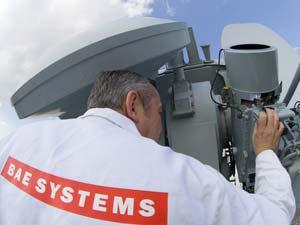U.S. defense firms’ future in peacekeeping
A BAE Systems employee (Image: BAE Systems)
Big American defense companies are branching out from tanks and war planes. They are making deals with the State Department and the Agency for International Development to provide everything from anthropologists to military trainers to such places as Afghanistan and Africa. August Cole is the defense industry reporter with the "Wall Street Journal," and he recently covered the new role for U.S. defense firms in the paper.
Cole: "Many of the big companies that the US has in the defense industry know that their traditional business around building ships or planes is fading away. And this is their latest push into the services market, which many of them think is the future."
It’s the future, Cole says, because: "… the budget pressure that we currently face is extraordinary, and the government’s appetite after doing a lot of downsizing in the last 15 years, to do many of the tasks that it once thought it would not need to, is still there. And so the opportunity — if you’re a Lockheed-Martin, Northrup Grummond, or even a BAE, which is a US arm of the British parent company — they’ve realized that there is a real need for doing tasks as simple as training peacekeepers in Africa. Although I shouldn’t say ‘simple’, those are quite complex. Those are missions that the military might have done, but as we’ve seen deployments extended and the tempo increased for operations abroad for our uniform military personnel, contractors are filling the void."
Cole explains the rationale for going to these defense contractors to fill the gap: "Well, to take the example of peacekeeping, it’s not that the contractors themselves are providing for-hire guards, it’s that they’re providing essentially teachers or trainers. That is a type of task that a few years ago would have fallen to United States Army special forces troops, who would go in and spend time with local military or national police and teach them how to be constables or paramilitaries in a peacekeeping environment. Everyone that would normally do that work is occupied in Iraq and Afghanistan, and so the companies are essentially hiring retired people who have that sort of special forces background or even law enforcement to come in and perform many of those same functions. So the scope of the work is very much the same but the people are not necessarily government employees anymore that you might find when you’re in a place Djibouti or Senegal or Liberia.
"Lockheed-Martin would have been focused on traditionally the fighter business, the space business. They’ve really been an aeronautics company. In the last six or seven years, they’ve picked up a variety of local firms. They use a lot of local hires to do everything from construct bases in east Africa, to advise the Afghan government on writing their constitution, to the business of training peacekeepers for duties in Darfur – and even supplying those peacekeepers with logistics. So it’s a much bigger footprint than they once had and accordingly they’re trying to structure through acquisitions, through hiring in just the right way so they can continue to grow well into the future doing this work. Nobody expects it to go away."
Nobody expects it to go away, certainly under this administration, which is making a more concerted effort to use soft power. But is this going to save the government money?
"Whether contractors save the government money is one of the thorniest questions in the last decade. During the 90s, that was the philosophy during a lot of the introduction of privatization initiatives. The battle-testing of that thesis, I think, in Iraq has made a lot of people very uncomfortable both in a cost level and a political level and almost at a moral level. Whether you find those same types of quandaries in non-combat situations isn’t quite clear. To be frank I think many of these missions simply will be out of the public’s eye and because they are reasonably non-controversial, it could be again as simple as digging wells or providing rule of law training, that it’s not going to have most likely the same sort of negative headlines that the high-threat very dangerous protective work in Iraq has generated for some of these companies."
As for whether the skill set required now, in using soft power, would be far removed from the skill set that was needed before: "Well, the premise of soft power is essentially based on getting people to do what you want through the powers of attraction. So the qualities of the individual you bring onto a contract are critical. And somebody who has spent a few years in Iraq riding around in a high speed protective detail may not find it to be a very comfortable experience to be digging wells or doing kind of more basic clinic work. That said, the military trains its people to be very dynamic to be able to do both tasks. Especially the most skilled trained forces can do that. So you may in fact see those people when they get out of the military, whether they retire or come out early, transitioning into this sort of soft power world because they have that discipline or professionalism that this company will require."
PRI’s "The World" is a one-hour, weekday radio news magazine offering a mix of news, features, interviews, and music from around the globe. "The World" is a co-production of the BBC World Service, PRI and WGBH Boston.
PRI’s coverage of social entrepreneurship is supported by the Skoll Foundation.
Every day, reporters and producers at The World are hard at work bringing you human-centered news from across the globe. But we can’t do it without you. We need your support to ensure we can continue this work for another year.
Make a gift today, and you’ll help us unlock a matching gift of $67,000!
